#Lehigh university press
Explore tagged Tumblr posts
Text






Book 507
Francesco di Giorgio: Checklist and History of Manuscripts and Drawings in Autographs and Copies from ca. 1470 to 1687 and Renewed Copies (1764-1839)
Gustina Scaglia
Lehigh University Press 1992
Francesco di Giorgio Martini (1439–1501) was, like his contemporary Leonardo da Vinci, a polymath. An architect, engineer, painter, sculptor, and writer, di Giorgio was born in Siena, where he apprenticed under the master Vecchietta. This book, composed from di Georgio’s sketchbooks and journals, focuses mainly on his engineering and architecture work, and his sketches and diagrams are incredible. Designs for a variety of machines—pumps, mills, weapons, all manner of contraptions—are shown in exacting detail with all the gears, levers, and pulleys precisely laid out. His designs are incredible for the age and may even rival those of Leonardo himself.
#bookshelf#library#personal collection#personal library#books#bibliophile#book lover#illustrated book#booklr#Francesco di georgio#gustina scaglia#Lehigh university press#art#renaissance art
3 notes
·
View notes
Text
Good question:

In the United States, many jails and prisons can and will charge you money for every single night that you spend imprisoned, for the entire duration of your incarceration, as if you were being billed for staying at a hotel. Even if you are incarcerated for years. Adding up to tens of thousands of dollars. What happens when you’re released?
In response to this:
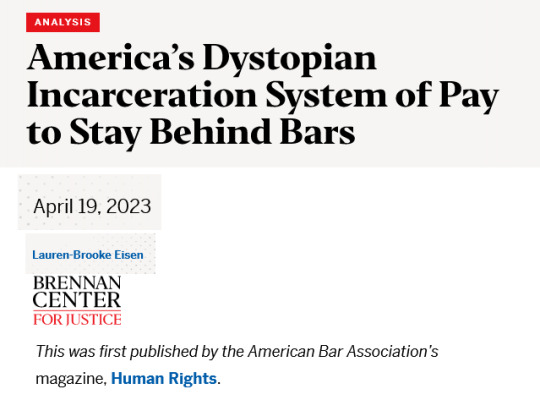


---
So.
You’re getting charged, like, ten dollars every time you even submit a request form to possibly be seen by a doctor or dentist.
You’re getting charged maybe five dollars for ten minutes on the phone.
Any time a friend or family tries to send you like five dollars so that you can buy some toothpaste or lotion, or maybe a snack from the commissary since you’re diabetic and the “meals” have left you malnourished, maybe half of that money gets taken as a “service fee” by the corporate contractor that the prison uses to manage your pre-paid debit card. So you’re already losing money every day just by being there.
What happens if you can’t pay?
In some places, after serving just a couple of years for drugs charges, almost 20 years after being released, the state can still hunt you down for over $80,000 that you “owe” as if it were a per-night room-and-board accommodations charge, like this recent highly-publicized case in Connecticut:


Excerpt:
Two decades after her release from prison, [TB] feels she is still being punished. When her mother died two years ago, the state of Connecticut put a lien on the Stamford home she and her siblings inherited. It said she owed $83,762 to cover the cost of her 2 1/2 year imprisonment for drug crimes. [...] “I’m about to be homeless,” said [TB], 58, who in March [2022] became the lead plaintiff in a lawsuit challenging the state law that charges prisoners $249 a day for the cost of their incarceration. [...] All but two states have so-called “pay-to-stay” laws that make prisoners pay for their time behind bars [...]. Critics say it’s an unfair second penalty that hinders rehabilitation by putting former inmates in debt for life. Efforts have been underway in some places to scale back or eliminate such policies. Two states — Illinois and New Hampshire — have repealed their laws since 2019. [...] Pay-to-stay laws were put into place in many areas during the tough-on-crime era of the 1980s and ’90s, said Brittany Friedman, an assistant professor of sociology at University of Southern California who is leading a study of the practice. [...] Connecticut used to collect prison debt by attaching an automatic lien to every inmate, claiming half of any financial windfall they might receive for up to 20 years after they are released from prison [...].
Text by: Pat Eaton-Robb. “At $249 per day, prison stays leave ex-inmates deep in debt.” AP News / The Associated Press. 27 August 2022.
---

---
Look at this:
To help her son, Cindy started depositing between $50 to $100 a week into Matthew’s account, money he could use to buy food from the prison commissary, such as packaged ramen noodles, cookies, or peanut butter and jelly to make sandwiches. Cindy said sending that money wasn’t necessarily an expense she could afford. “No one can,” she said. So far in the past month, she estimates she sent Matthew close to $300. But in reality, he only received half of that amount. The balance goes straight to the prison to pay off the $1,000 in “rent” that the prison charged Matthew for his prior incarceration. [...] A PA Post examination of six county budgets (Crawford, Dauphin, Lebanon, Lehigh, Venango and Indiana) showed that those counties’ prisons have collected more than $15 million from inmates — almost half is for daily room and board fees that are meant to cover at least a portion of the costs with housing and food. Prisoners who don’t work are still expected to pay. If they don’t, their bills are sent to collections agencies, which can report the debts to credit bureaus. [...] Between 2014 and 2017, the Indiana County Prison — which has an average inmate population of 87 people — collected nearly $3 million from its prisoners. In the past five years, Lebanon’s jail collected just over $2 million in housing and processing fees.
Text by: Joseph Darius Jaafari. “Paying rent to your jailers: Inmates are billed millions of dollars for their stays in Pa. prisons.” WHYY (PBS). 10 December 2019. Originally published at PA Post.
---
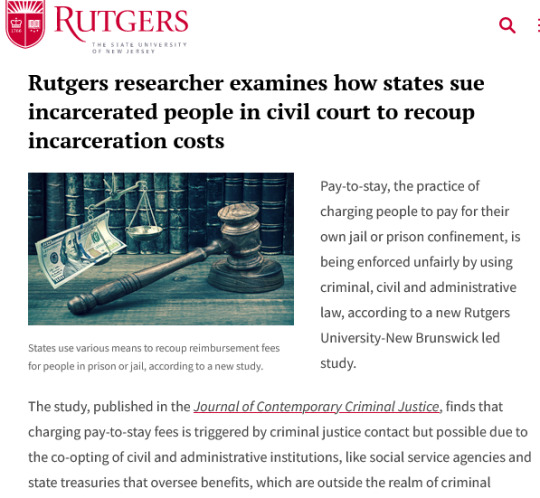
Pay-to-stay, the practice of charging people to pay for their own jail or prison confinement, is being enforced unfairly by using criminal, civil and administrative law, according to a new Rutgers University-New Brunswick led study. The study [...] finds that charging pay-to-stay fees is triggered by criminal justice contact but possible due to the co-opting of civil and administrative institutions, like social service agencies and state treasuries that oversee benefits, which are outside the realm of criminal justice. “A person can be charged $20 to $80 a day for their incarceration,” said author Brittany Friedman, an assistant professor of sociology and a faculty affiliate of Rutgers' criminal justice program. “That per diem rate can lead to hundreds of thousands of dollars in fees when a person gets out of prison. To recoup fees, states use civil means such as lawsuits and wage garnishment against currently and formerly incarcerated people, and regularly use administrative means such as seizing employment pensions, tax refunds and public benefits to satisfy the debt.” [...] Civil penalties are enacted on family members if the defendant cannot pay and in states such as Florida, Nevada and Idaho can occur even after the original defendant is deceased. [...]
Text by: Megan Schumann. “States Unfairly Burdening Incarcerated People With “Pay-to-Stay” Fees.” Rutgers press release. 20 November 2020.
---
So, to pay for your own imprisonment, states can:
-- hunt you down for decades (track you down 20 years later, charge you tens of thousands of dollars, and take your house away)
-- put a lien on your vehicle, house
-- garnish your paycheck/wages
-- seize your tax refund
-- send collections agencies after you
-- take your public assistance benefits
-- sue you in civil court
-- take money from your family even after you’re dead
9K notes
·
View notes
Text
Lee Iacocca
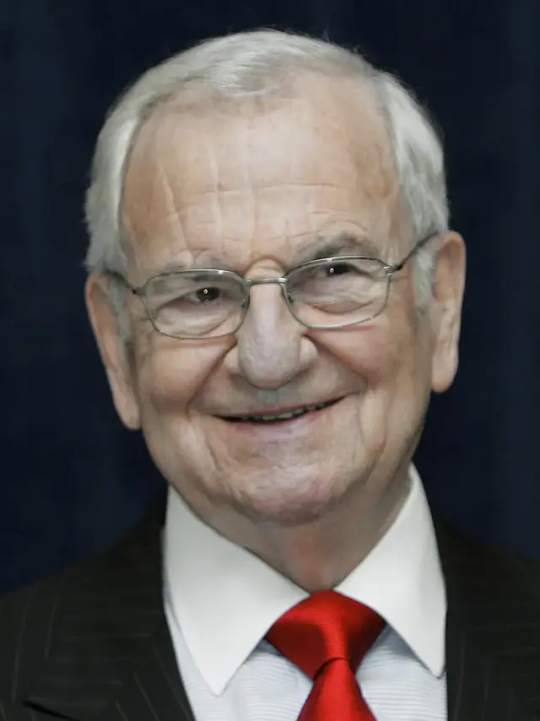
Physique: Average Build Height: 5'8" (1.72 m)
Lido Anthony "Lee" Iacocca (October 15, 1924 – July 2, 2019; aged 94) was an American automobile executive best known for the development of the Ford Mustang, Continental Mark III, and Ford Pinto cars while at the Ford Motor Company in the 1960s, and for reviving the Chrysler Corporation as its CEO during the 1980s. He was president of Chrysler from 1978 to 1991 and chairman and CEO from 1979 until his retirement at the end of 1992. He was one of the few executives to preside over the operations of two of the United States' Big Three automakers.
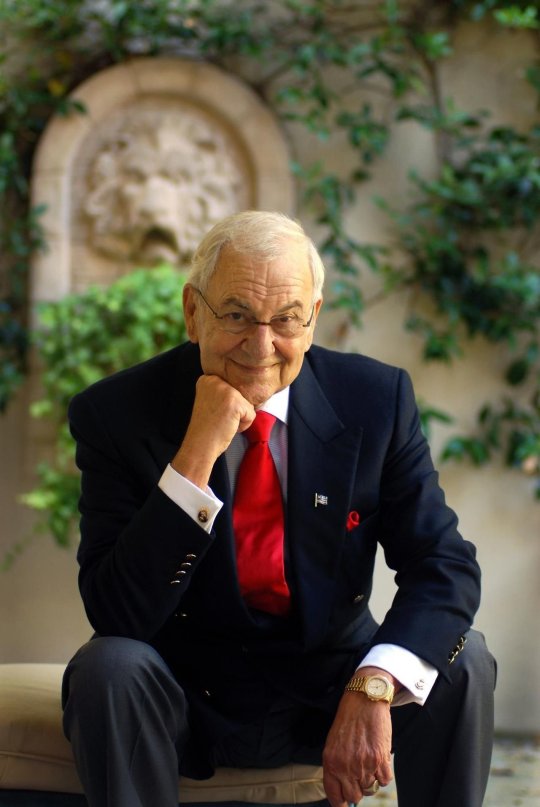
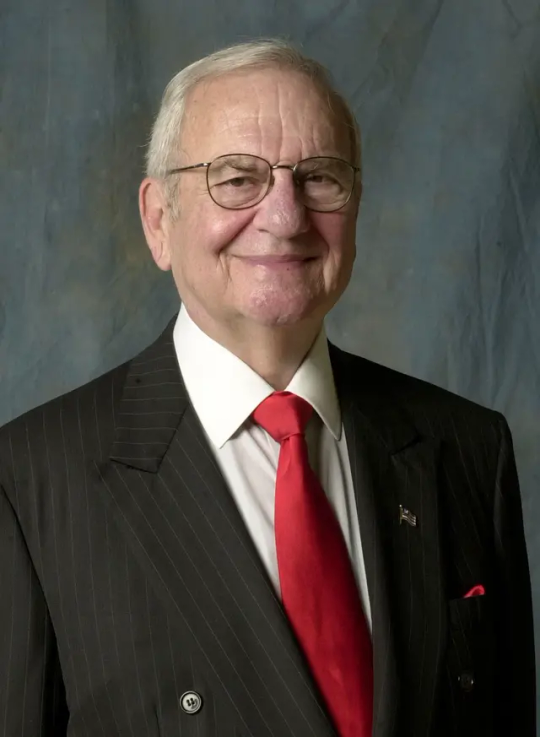
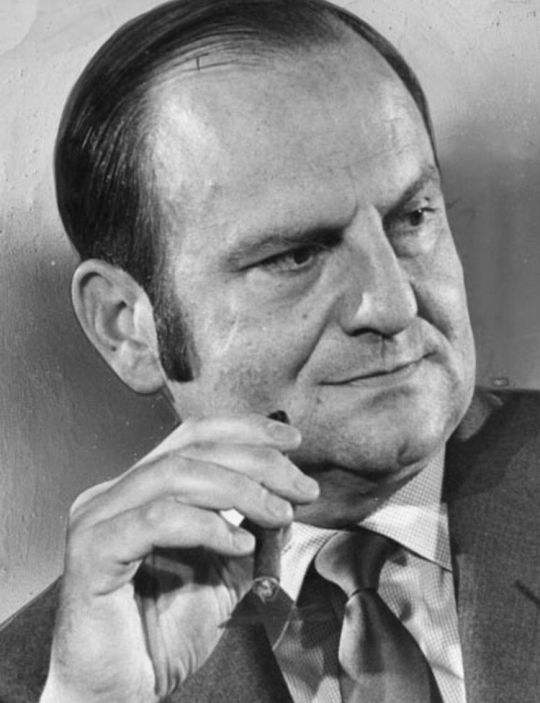

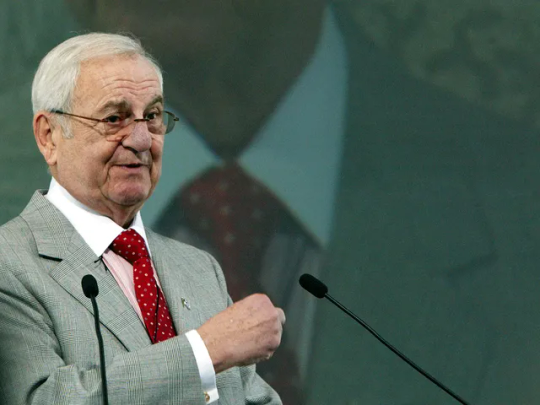
Born in Allentown, Pennsylvania, Iacocca graduated with honors from Allentown High School in Allentown in 1942. He attended Lehigh University, graduating with a degree in industrial engineering. After graduating from Lehigh, he went to Princeton University, where he earned a master's degree in mechanical engineering in 1946.

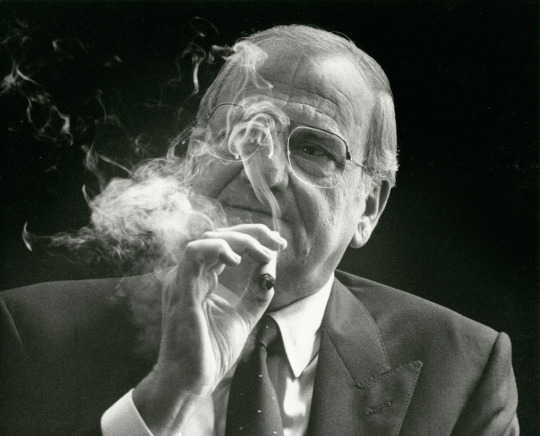
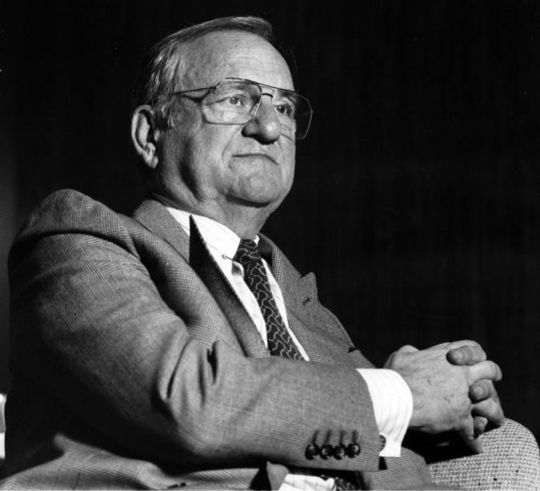
Iacocca started working at Ford Motor Company in 1946, and was a major figure in the development of the Ford Mustang. He was named president of Ford in 1970, but was fired by Henry Ford Jr. in 1978. He was then hired by Chrysler Corp. in 1978 and became the company’s CEO in 1979. He is credited with saving the company from bankruptcy.



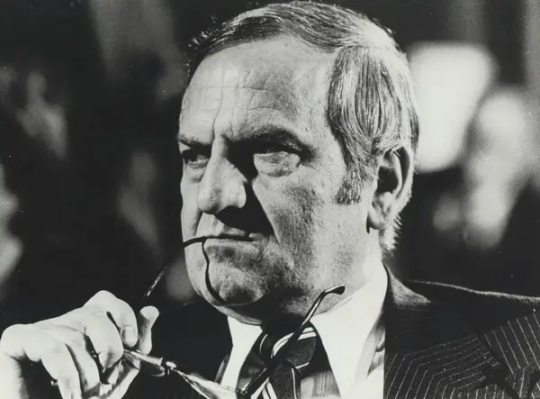
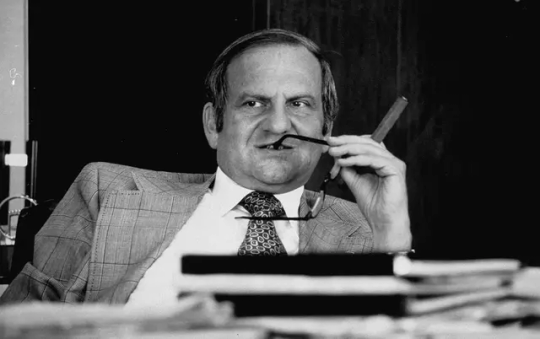
A heroic figure to many Americans, mobbed by admirers and pursued by the press. Like most men, he had a rugged handsomeness of his own and had a penchant for cigars, vinyl car roofs and Greek-temple grilles. I first notice him when he appeared on The Late Show with Jay Leno back in 1993 and I wanted to blow him ever since. He died at his home in Bel Air, at the age of 94. He is survived by two daughters and eight grandchildren.
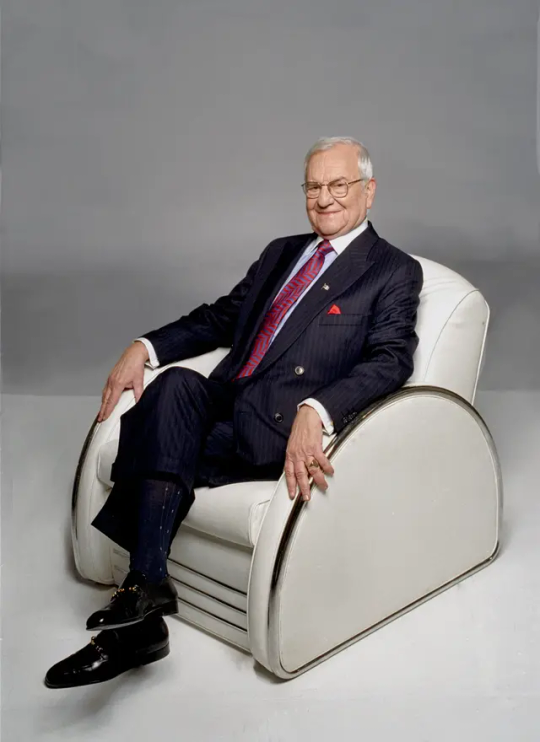
59 notes
·
View notes
Text
Wednesday, March 27, 2024
How a cargo ship took down Baltimore’s Key Bridge (Washington Post) To bridge experts, the collapse of Baltimore’s Francis Scott Key Bridge after being hit by a heavy cargo ship was as inevitable as it was devastating. When a vessel as heavy as the Singapore-flagged Dali collides with such force against one of the span’s supercolumns, or piers, the result is the type of catastrophic, and heartbreaking, chain reaction that took place early Tuesday. “If the column is destroyed, basically the structure will fall down,” said Dan Frangopol, a bridge engineering and risk professor at Lehigh University in Pennsylvania who is president of the International Association for Bridge Maintenance and Safety. “It’s not possible to redistribute the loads. It was not designed for these things.” No bridge pier could withstand being hit by a ship the size of the Dali, said Benjamin W. Schafer, a professor of civil and systems engineering at Johns Hopkins University. In video imagery, the ship can be seen losing electrical power, then briefly regaining it before going completely dark. The ship issued a mayday call shortly before striking the bridge, giving officials time to stop traffic and try to evacuate it before it fell into the river.
DeSantis Signs Social Media Bill Barring Accounts for Children Under 14 (NYT) Florida on Monday became the first state to effectively bar residents under the age of 14 from holding accounts on services like TikTok and Instagram, enacting a strict social media bill that is likely to upend the lives of many young people. The landmark law, signed by Gov. Ron DeSantis, is one of the more restrictive measures that a state has enacted so far in an escalating nationwide push to insulate young people from potential mental health and safety risks on social media platforms. The statute both prohibits certain social networks from giving accounts to children under 14 and requires the services to terminate accounts that a platform knew or believed belonged to underage users. It also requires the platforms to obtain a parent’s permission before giving accounts to 14- and 15-year-olds. In a press conference on Monday, Mr. DeSantis said it will help parents navigate “difficult terrain” online. He added that “being buried” in devices all day long was not the best way to grow up. The new Florida measure is almost certain to face constitutional challenges over young people’s rights to freely seek information and companies’ rights to distribute information.
Joe Biden’s Political Origin Story Is Almost Certainly Bogus (Politico/Washington Free Beacon) A new investigation from The Washington Free Beacon’s Joseph Simonson and Andrew Kerr raises major questions about a story President Joe Biden has long told: when he successfully defended a construction company as a young lawyer from an injured welder’s lawsuit. Biden said feeling guilty over his role pushed him to switch to public defense and politics. But the Free Beacon finds that “this story is almost certainly a complete work of fiction”—that the case in question seems to have happened while Biden was still in law school, and the welder actually won.
U.S. allows U.N. ceasefire vote, but it’s too late for many in Gaza (Washington Post) In a surprise move Monday, the United States abstained during a United Nations Security Council vote calling for an immediate cease-fire in Gaza. For many people in Gaza, the passage of the Security Council comes far too late. The Israeli campaign in Gaza has killed more than 32,000 Palestinians, including many women and children, forced the overwhelming majority of people in Gaza to flee their homes and plunged more than half of Gaza’s population into a de facto famine. Small children are dying of malnutrition in what U.N. officials describe to be the broadest and most severe food crisis in the world. On Monday, Israeli forces continued their week-long raid of al-Shifa Hospital in Gaza City amid Israeli claims of a Hamas presence in the facility. Israel also said it would cease cooperation with UNRWA, the U.N. agency that distributes most aid to Palestinians in the Gaza Strip and what U.N. Secretary General António Guterres describes as “the one ray of light for millions of people” subsisting of its support. Through all this, the United States has operated hand-in-glove with Israel, greenlighting a surge in arms transfers to reinforce the Israeli military’s relentless bombing campaigns.
Forest fires burn in nearly half of Mexico’s drought-stricken states, fueled by strong winds (AP) Forest fires were burning in nearly half of Mexico’s drought-stricken states Monday fueled by strong winds. The National Forestry Commission reported 58 active fires in 15 states, including in protected nature reserves in Morelos, Veracruz and Mexico states. A preliminary estimate of the affected area reached more than 3,500 acres (1,421 hectares).
Venezuela’s main opposition coalition unable to register a presidential candidate (AP) The main Venezuelan opposition coalition said early Tuesday that electoral authorities didn’t let it register its presidential candidate as the deadline ended, in what it called the latest violation to the citizens’ right to vote for change in the South American country. Hours before the opposition coalition couldn’t register Yoris, President Nicolás Maduro made official his candidacy for a third term that would last until 2031. Polls show the unpopular Maduro would be trounced by a landslide if Venezuelan voters were given half a chance.
Brazil Police to Probe Bolsonaro’s Stay at Hungary Embassy (Bloomberg) Brazil’s Supreme Federal Court on Monday gave former President Jair Bolsonaro 48 hours to explain why he stayed at the Hungarian Embassy in Brasília for two days in February. According to security footage obtained by the New York Times, Bolsonaro appeared to seek political asylum from Budapest mere days after federal authorities confiscated his passport as part of a criminal investigation into whether he tried to incite an insurrection and purposefully spread voting disinformation, among other charges. On Monday, Brazil’s federal police launched an investigation into the far-right leader’s movements. Bolsonaro confirmed that he stayed at the embassy beginning Feb. 12 but only said, “I have a circle of friends with some world leaders. They’re worried,” when asked why. His lawyers added that Bolsonaro’s visit was to discuss political matters. The Hungarian Foreign Ministry refused to comment.
Moscow rampage reveals ambition, deadly reach of ISIS successor groups (Washington Post) A few months before being killed in a U.S. Special Forces raid, Islamic State leader Abu Bakr al-Baghdadi released a final video message that symbolically passed the torch to far-flung followers in distant lands. His self-declared caliphate had been defeated, he acknowledged, and it was now up to the terrorist group’s regional chapters to carry out “revenge operations” around the world. “Our battle today is one of attrition and stretching the enemy,” Baghdadi said in the April 2019 video, released just after the fall of the Islamic State’s last stronghold in Syria. “They should know that jihad is ongoing until the Day of Judgment.” Friday’s bloodbath at a suburban Moscow concert hall is but the latest reminder of how effectively Baghdadi’s brutal vision is being carried out. While his self-proclaimed Middle East “caliphate” is in ruins, a constellation of Islamic State regional affiliates is gaining strength in many parts of the globe, fueled by a mix of traditional grievances as well as new ones, including the war in Gaza, counterterrorism officials and experts say.
Japan approves plan to sell fighter jets to other nations in latest break from pacifist principles (AP) Japan’s Cabinet on Tuesday approved a plan to sell future next-generation fighter jets that it’s developing with Britain and Italy to other countries, in the latest move away from the country’s postwar pacifist principles. The contentious decision to allow international arms sales is expected to help secure Japan’s role in the joint fighter jet project and part of a move to build up the Japanese arms industry and bolster its role in global security. The Cabinet also endorsed a revision to Japan’s arms equipment and technology transfer guidelines to allow coproduced lethal weapons to be sold to countries other than the partners. Chief Cabinet Secretary Yoshimasa Hayashi said the changes are necessary given Japan’s security environment, but stressed that Japan’s pacifist principles remain unchanged.
Israeli Soldier’s Video Undercuts Medic’s Account of Sexual Assault (NYT) New video has surfaced that undercuts the account of an Israeli military paramedic who said two teenagers killed in the Hamas-led terrorist attack on Oct. 7 were sexually assaulted. The unnamed paramedic, from an Israeli commando unit, was among dozens of people interviewed for a Dec. 28 article by The New York Times that examined sexual violence on Oct. 7. He said he discovered the bodies of two partially clothed teenage girls in a home in Kibbutz Be’eri that bore signs of sexual violence. The Associated Press, CNN and The Washington Post reported similar accounts from a military paramedic who spoke on condition of anonymity. Nili Bar Sinai, a member of a group from the kibbutz that looked into claims of sexual assault at the house, said, “This story is false.”
Israeli settlers eye Gaza beachfront (BBC) Israel unilaterally pulled out of Gaza in 2005, but some in the Israeli settler movement still hope to go back, one day. Daniella Weiss, who heads a radical settler organisation called Nachala, or homeland, says she already has a list of 500 families ready to move to Gaza immediately. We meet Daniella at her home in the West Bank settlement of Kedumim, where red-roofed houses are spread over hilltops and valleys. Her vision for the future of Gaza—now home to 2.3 million Palestinians, many of them starving—is that it will be Jewish. “Gaza Arabs will not stay in the Gaza Strip,” she says. “Who will stay? Jews.” She claims that Palestinians want to leave Gaza and that other countries should take them in. “Africa is big. Canada is big. The world will absorb the people of Gaza. How we do it? We encourage it. Palestinians in Gaza, the good ones, will be enabled. I’m not saying forced, I say enabled because they want to go,” she says. There is no evidence that Palestinians want to leave their homeland—although many may now dream of escaping temporarily, to save their lives. I put it to her that her comments sound like a plan for ethnic cleansing. She does not deny it.
Young Opposition Candidate Set to Become Senegal’s President (NYT) With the concession of his main rival, a young political outsider backed by a powerful opposition figure has won a surprise outright victory in Senegal’s presidential election only 10 days after being released from jail. Bassirou Diomaye Faye is the anointed candidate of Senegal’s popular and controversial opposition politician Ousmane Sonko. Mr. Faye’s main rival, the governing party candidate Amadou Ba, conceded in a statement congratulating his rival on Monday for winning in the first round. Mr. Faye, who celebrated his 44th birthday on Monday, will become the West African country’s youngest ever president, and the youngest elected president currently serving in Africa. (There are younger leaders, but they came to power by force.) He had been jailed on charges of defamation and contempt of court, and was awaiting trial. Mr. Faye and Mr. Sonko have captivated young people by excoriating political elites, pledging to renegotiate contracts with oil and gas companies, and promising “monetary sovereignty”—Senegal is one of 14 countries that use the CFA, a currency pegged to the euro and backed by France.
Puppets (Los Angeles Times) The Los Angeles Puppetry Guild represents a diverse bunch, from amateurs to industry professionals, and judging by member rolls puppetry is having a real moment right now. The L.A. guild is up to 200 members, and the Puppeteers of America now recognizes it as the largest such regional body in the country. The surge is mostly people in their 20s and 30s. One theory is that CGI becoming firmly mainstream when it comes to film effects has provoked some yearning for the more tactile medium of puppets.
0 notes
Photo

Weird Mysticism: Philosophical Horror and the Mystical Text (Critical Conversations in Horror Studies), by Brad Baumgartner, Lehigh University Press, 2020. Cover image by Giovanni Muzio (Kesson), info: rowman.com.
Weird Mysticism identifies and evaluates a new category of theoretical inquiry by showing the influence of speculative writing on three intersecting critical categories: horror fiction, apophatic mysticism, and philosophical pessimism. Exploring the work of Thomas Ligotti, Georges Bataille, and E.M. Cioran, Baumgartner argues that these “weird mystics” employ an innovative mode of negative writing that seeks to merge new conceptions of reality. While exploring perennial questions about “the absolute,” the Outside, and other philosophical concepts, these authors push the limits of representation, experimenting with literary form, genre-bending, and aphoristic discourse. As their works reveal, the category of weird mysticism both conjoins and obscures the link between traditional mysticism and philosophical horror fiction, with weirdness itself being the central magnet that draws the seemingly disparate realms of horror fiction, philosophy, and mysticism together. Highlighting the theoretical stakes of the horror genre, Baumgartner’s study reveals how the mystical potentially recuperates the limits of philosophical thinking, enabling reflection on—and possibly challenging—the limits of human understanding.
Contents: Introduction: The Path to Nowhere 1. Piercing the Cosmological Horizon 2. Thomas Ligotti: The Poetics of Darkness 3. Georges Bataille: Opening Up the Infinite 4. E.M. Cioran: The Horror of Being Oneself Afterword: The Mystical Death of the Speculative Critic Works Cited Index About the Author
#book#essay#weird essay#horror essay#weird mysticism#philosophical pessimism#philosophical horror#weird studies#horror studies
73 notes
·
View notes
Photo

Socially Distanced Design
With the demand for life-saving N95 face masks outstripping supply, one solution is for hospitals to sterilise and reuse them. But how? In the absence of dedicated mask sterilisation devices, a team of engineers at Lehigh University in Bethlehem, Pennsylvania decided to take matters into their own hands and design one for their local hospital, St Luke’s. Remarkably, they did so without once physically meeting each other or hospital staff. Using emails, video and phone calls, the team developed the design from their homes. They then ordered parts online to construct individual components and delivered these to prearranged drop-off sites for hospital staff to collect. Hospital machinists and engineers then assembled the components on site. The machine (pictured) which can decontaminate several thousand masks a day, is now fully operational serving St Luke’s healthcare providers, meaning they in turn can safely serve their patients.
Written by Ruth Williams
Image and research from St. Luke's University Health Network
in collaboration with Lehigh University, Bethlehem, PA, USA
Image copyright held by St. Luke's University Health Network
Press release published by Lehigh University, April 2020
You can also follow BPoD on Instagram, Twitter and Facebook
#science#biomedicine#covid19#covid-19#covid2019#novel coronavirus#sarscov2#face mask#n95 face mask#uv-c#uv light#bug zapper#social distancing
19 notes
·
View notes
Text
For Winterhawk Week, Day 3
Ao3 Link
Bond:
Clint looked up from the cash register at Strike Bean Delta when he heard the door open and a cacophony of voices filled the small shop. Things had been quiet this morning, but with the new recruits arriving at Camp Lehigh today he hadn’t expected it to stay that way for long.
Sometimes Clint hated being right.
A whole pack of rowdy young men in army fatigues jostled for space as they stared at the menu above Clint’s head. He was about to roll his eyes at their ridiculous posturing when he laid eyes on one of them and felt a sharp pang of - something.
There was nothing particularly remarkable about him. Grey-blue eyes and brown hair cropped army regulation short, he looked the same as half the kids who came through here for training. Yet Clint felt an immediate bond. Not lust. Definitely not lust, but more like… an old, comfortable friendship. Which was ridiculous because they’d never met before.
When grey-blue eyes came up to the counter to place his order - medium dark-roast with extra room for cream - he paused, hand in the air and blinking slowly as he went to hand Clint his money. He shook his head slightly before asking, “Have we met?”
Clint took the money and counted back his change before replying, “I don’t think so”.
He seemed as confused as Clint, but didn’t press it, walking away to let Clint take the next order. On his way out he stuffed a five dollar bill in the tip jar, which seemed to indicate something, though Clint had no idea what it could be.
Like many of the new recruits, grey-blue eyes became a regular over the next few months. Strike Bean Delta was the closest coffeeshop to the base, and got a steady stream of business from army folk who quickly tired of whatever institutional swill they served in the mess hall.
With time Clint learned his name was James, but he went by Bucky of all things. He learned that he was eighteen, fresh out of high school, and had enlisted with his best friend Steve. He had big plans for when he got out of the army, most of which involved going to school and getting some kind of advanced science degree. He took his coffee with a frankly obscene amount of cream and sugar, and had a penchant for apricot cheese danishes.
Basically, he was nothing like Clint.
Clint took his coffee black, and often straight from the pot when he wasn’t working. He wasn’t a big fan of pastry, possibly because only ate them when they were stale - two days old and unfit to sell to customers, even at a discount. Technically he was supposed to throw them out, but he wasn’t about to go wasting food that was still edible.
Clint had dropped out of high school at sixteen and immediately started doing whatever it took to keep food on the table. You know, when he managed to find a place that actually had a table. He was living on the street and had started getting into some real shady shit when he’d been approached by a guy who did outreach for a youth shelter. Somehow between Nick and Phil and the other counselors at SHIELD (Shelter for Homeless something or other - Clint could never remember the full name) they managed to help him get his life back on track. They weren’t good tracks. They were rusty and uneven and usually full of giant splinters, but they were his tracks all the same.
When Bucky told him he’d been assigned to a unit and would be shipping out the next day, Clint told him to stay safe and impulsively scrawled his phone number on the side of Bucky’s cup. Bucky stuffed a twenty dollar bill in the tip jar on his way out.
Clint got a text from an unfamiliar number a couple weeks later. It had a picture of the most dilapidated coffeemaker Clint had ever seen, and looked like it had been set up on a stack of crates in some kind of tent. The text read “I’d kill for a cold brew right now. -Bucky”.
Clint laughed and sent back a picture of the fruit danishes in the display case.
“Fuck, I’d kill for those too,” was the reply.
They’d been texting on and off for close to a year - mostly idle chatter and pictures of deserts and humvees (Bucky) or coffee and dogs (Clint) - when Clint woke up screaming in the middle of the night, feeling like his arm was on fire.
“What’s going on with your arm?” Natasha asked him later that day.
Clint shook out his arm for what felt like the millionth time, wishing the pins and needles feeling would go away. He really didn’t want to drop a pot of hot coffee on himself today. It wouldn’t be the first time, but he tried not to make a habit out of it. “I probably just slept on it wrong,” he told her.
Weeks later, his arm was still giving him problems.
“Go see a doctor; you probably have a pinched nerve,” Natasha told him.
“A doctor? Who can afford that?” he asked. Health insurance was for people with Real Jobs. He worked at a coffee shop. Besides, he was more worried about the fact he’d sent Bucky a picture of the cutest samoyed he’d ever seen and Bucky still hadn’t responded. One time he’d sent back a picture of one of the bomb sniffer dogs, and Clint still wasn’t over the cuteness of the german shepherd in its little vest and goggles. Clint wasn’t too proud to admit he was hoping for a reprise.
When Bucky stepped into Strike Bean Delta almost six months later, Clint wouldn’t have recognised him if he hadn’t felt that sharp pang of something when he walked in the door.
Bucky was wearing civvies, long hair tied up in a messy half-bun, and a lot more shadows under his eyes than when he’d left. Most notably, though, was the distinct lack of a left arm.
Clint’s own arm went numb at the sight, and the blender he was holding fell to the ground with a loud crash. Strawberry-banana smoothie coated his shoes and oozed slowly across the floor.
“Aww, smoothie, no,” he whined, and a wet towel hit him in the face, courtesy of Natasha.
Cleaning up the smoothie gave him plenty of time to try to sort through his feelings, because he was having a lot of them. Like, a LOT of them. By the time he finished cleaning up his mess, his feelings still weren’t sorted, but Bucky was sitting awkwardly at one of the tables with a coffee in front of him.
“Talk to him,” Natasha said, forcing a plate with an apricot cheese danish into his hands. “Don’t drop it,” she added a second later.
“But Nat,” he whined, sneaking a glance at Bucky who was staring into his coffee like it held the secrets of the universe.
“Talk. To. Him,” she repeated, turning Clint around by the shoulders and giving him a literal shove in the right direction.
“Uhh, I’m glad you’re back,” Clint said, sliding the plate in front of Bucky and taking the seat across from him. He nodded at the missing arm. “I’m guessing that’s why I stopped getting pictures of cute dogs in uniform?”
Bucky looked surprised, then let out a sharp bark of laughter. “Doctors tend to frown on having animals in the ICU,” he said. “Didn’t think you’d be interested in pictures of cups of jello.”
Clint smiled, nervousness relaxing into a feeling of ease he seldom felt with other people. He rubbed his left arm unconsciously, telling Bucky, “You’d be surprised.”
That got another laugh out of him and Bucky’s shoulders relaxed as he reached over to take a bite out of the danish. “Oh man, I’ve wanted this for so long” he said, tipping his head back and closing his eyes briefly. “You do not know how many nights I dreamed about coming back here just to eat one of these things.”
Clint remembered all the times he’d had an unexpected pastry craving over the past few months and thought that maybe he did.
“Who are you?” he asked abruptly. As soon as the words left his mouth Clint realized how crazy he must sound, but judging by the look Bucky leveled at him, he knew exactly what Clint was asking.
Bucky took another bite out of the danish and chewed slowly, looking Clint over as if he didn’t know quite what to do with him. “I suppose I could ask you the same question,” he drawled as he finished chewing. “Who’s the mysterious barista that keeps showing up in my dreams?”
“You dream about me?” Clint asked.
Bucky raised an eyebrow. “You don’t?”
Clint shook his head. “No, not really. I just get these… I dunno, feelings? I don’t know how to explain it. I’m pretty sure I felt when you lost your arm.”
“Fuck, I’m sorry,” Bucky said, clearly startled. “That’s- that’s so messed up. I’m really sorry.”
“Don’t be,” Clint said with a shrug. It wasn’t like he had any control over it - like either of them had any control over whatever the heck this was. “Still doesn’t answer my question, though.”
“Last week I dreamt you lost your keys. You thought you’d dropped them on the subway and you had to have the neighbor let you in,” he told Clint, eyes seemingly focused somewhere past Clint’s left ear. “Last month I dreamt you were at a gun range, except you were hitting the targets using a bow and arrows. Last year when I was deployed I dreamt about you making coffee more times than I could count. One time you were making it while wearing a crocodile costume. I thought I was just missing home, but now? I don’t know.”
Clint put his head in his hands as Bucky continued to stare off into space. He should probably be getting back to work soon, but this was too weird for words. He’d definitely done all of those things in real life. “It wasn’t a crocodile costume,” he said finally, at a loss for anything better to say. “It was Abigail the Alligator, the mascot for the sporting goods shop I buy my arrows from. They booked a coffee service for a special event, and they offered me a bonus for wearing the costume.”
Bond, Part II: Here
13 notes
·
View notes
Text
i think i'm falling for you
read it on the AO3 at https://ift.tt/2N2vFln
by IronSwordStarShield (SweetFanfics)
If pressed on the subject of his sexuality, Captain Stevens gruff reply would catch most people off guard and confuse the remaining. “I never let myself think about liking guys because I suspected I might like ‘em so I nipped that in the bud before it even got started.” Simply put, he’s never allowed himself permission to open that particular door. But there’s never been temptation to open it either. Sure, sometimes he lingers in front of the closed door, fleeting wondering, what if. But it isn’t true temptation. Not until Doctor Potts joins the Camp Lehigh team.
Words: 1425, Chapters: 1/1, Language: English
Fandoms: Marvel Cinematic Universe
Rating: General Audiences
Warnings: No Archive Warnings Apply
Categories: M/M
Characters: Doctor Potts - Character, Captain Stevens - Character
Relationships: Steve Rogers/Tony Stark
Additional Tags: doctor potts/captain stevens, Falling In Love, mildly in denial steve
read it on the AO3 at https://ift.tt/2N2vFln
8 notes
·
View notes
Text
Beware the Spanish inscription: A French Book of Hours, an Admiral, and an Iberian patron(?)
Fifty-two discoveries from the BiblioPhilly project, No. 13/52
Book of Hours, Use of Rome, France, ca. 1475, Philadelphia, Free Library of Philadelphia, Lewis E 212, fols. 31r and 210v (beginning of the Hours of the Virgin with miniature of at Annunciation, and subsidiary scenes from the Life of the Virgin; suffrage of Saint Catherine with small miniature, showing rotunda-style script and the work of a second artist)
The Free Library of Philadelphia’s Lewis E 212 is a quite finely produced and well-preserved French Book of Hours of around 1475. Looking closely at its miniatures, we can determine that they are by two distinct artists: a more skilled and possibly younger artist, likely trained in Tours, was responsible for the pastel-like calendar vignettes and thirteen small miniatures; another artist, likely trained in Paris, produced the eleven large miniatures and their borders, as well as the small miniature for the Obsecro te. We prefer the luscious style of the former, as evidenced by the lovely calendar scenes. But who are we to judge?
Lewis E 212, fols. 2r–13v (details of calendar vignettes with labors of the months and signs of the zodiac)
However, what grabs our attention more than the division of labor between two distinct artists trained in Paris and Tours respectively, a phenomenon that is well-attested elsewhere elsewhere,[1] is the book’s calligraphy. The manuscript’s large, clear, southern Rotunda script is unusual for a manuscript completed in the Loire Valley or Paris, and is more typical of manuscripts produced in Spain or Italy. In fact, a barely discernible inscription at the top of folio 1r is written in Spanish; this is likely what prompted Seymour de Ricci to state that it “was in Spain, ca. 1600” when he described the manuscript over eighty years ago.
Lewis E 212, fol. 1r (prayer in Spanish, with contrast-adjusted detail)
A close inspection of the inscription shows that the first line reads “La oracion del emperador…,” while the second ends with instructions for when the prayer is to be recited: “…in la mañana y a la noche.” The presence of this inscription, coupled with the unusual Rotunda script of the manuscript, point, perhaps, to it being originally intended for a Spanish patron. The production of bespoke manuscripts for the Spanish market was relatively frequent in the Netherlands (and we in fact encountered it previously in a Book of Hours from Lehigh University), but it is very unusual for France.
Lewis E 212, upper cover (with arms of Jean-Louis Girardin de Vauvré); Portrait of Jean-Louis Girargin de Vauvré, after Hyacinthe Rigaud
The later ownership of the manuscript by the superintendent of the French Navy Jean-Louis Girardin de Vauvré (1642–1724), confirmed by the presence of his arms on the binding (a shield with three bird heads), is interesting, as he was heavily involved in the War of the Spanish Succession. Though we have no precise knowledge of his book collecting habits, as a highly mobile Naval official he would have had ample opportunity to acquire such a book during his travels.
Photo of Lydia Thompson Morris, University of Pennsylvania, Morris Arboretum Archives; Portrait of Isaac Paschall Morris by a Follower of Thomas Sully, ca. 1835–40, Philadelphia, Philadelphia Museum of Art, 1928-7-121
Incidentally, the book’s presence in the collections of the Free Library of Philadelphia is due to the generosity of Lydia Thompson Morris (1849–1932), who donated historic Cedar Grove house (in West Fairmount Park) to the Philadelphia Museum of Art. Together with her brother John, she owned the large Compton estate in Chestnut Hill that was to become the Morris Arboretum of the University of Pennsylvania. Lydia and John Morris had inherited much of their wealth from their father, Isaac Paschall Morris (1803–1869), who had grown wealthy supplying iron fittings for ships.
[1] See Thomas Kren, “Seven Illuminated Books of Hours Written by the Parisian Scribe Jean Dubreuil, c. 1475–1485,” in Reading Texts and Images: Essays on Medieval and Renaissance Art and Patronage in Honour of Margaret M. Manion, ed. Bernard J. Muir (Exeter: University of Exeter Press, 2002), 157–200.
from WordPress http://bibliophilly.pacscl.org/beware-the-spanish-inscription-a-french-book-of-hours-for-a-spanish-patron/
14 notes
·
View notes
Photo

AAD welcomes to the department Samantha Jaff. Adjunct professor Jaff is teaching architectural design ARCH 43 and ARCH 143 this spring. Samantha Jaff is an Architect and Adjunct Professor at the Lehigh University Dept. of Art, Architecture, and Design. She has been practicing architecture in New York City with Davies Toews Architecture for the last seven years, with expertise in the execution of residential and commercial projects at various scales. She is a co-editor of Perspecta 51: Medium, The Yale Architectural Journal, published by MIT Press in 2018. Samantha earned an M.Arch from Yale University where she received the Sonia Albert Schimberg Prize, and a B.A. in Art History and Architecture from Colby College. #lehighuniversity #art #architecture #design #architecturaldesign (at Lehigh University Art, Architecture and Design) https://www.instagram.com/p/CpLjrUPO9Gf/?igshid=NGJjMDIxMWI=
0 notes
Photo










Lehigh University Libraries Receive the Rodale Archives.
From decades of revolutionary organic farming and research to promoting a healthy lifestyle through worldwide publishing, the trusted Rodale family name has become synonymous with health and well-being. Patriarch J.I. Rodale pioneered the wellness movement and began the Rodale Institute and Rodale Press to support his mission of optimum living. Devotedly carried on by three more generations of his family, groundbreaking success stories include organic farming government policy change and funding and educating millions through global publications such as Runner’s World and Organic Gardening magazines.
When it was time to think about preserving Rodale’s history, the family turned to Lehigh University and donated the Rodale Archives, now known as the Rodale Collection, to Linderman Library’s Special Collections. Read the whole article here.
24 notes
·
View notes
Text
Hofstra University

Peter S. Kalikow School of Government, Public Policy and International Affairs and The Peter S. Kalikow Center for the Study of the American Presidency and the Department of Political Science present
Getting Closer to Electing Madam President
Nichola D. Gutgold is a professor of communication arts and sciences at Penn State Lehigh Valley. An internationally recognized scholar on the rhetoric of women in non-traditional fields, her research has been featured in The New York Times, San Francisco Chronicle, NPR, US News and World Report, the Los Angeles Times, as well as international press outlets. Dr. Gutgold’s newest book is Electing Madam Vice President: When Women Run Women Win is available for purchase at http://tiny.cc/0fnjuz.
Tuesday, October 12, 1-2:25 p.m. Guthart Theater, Axinn Library, First Floor, South Campus Admission: Free Advance registration is required.
More info and to RSVP visit https://news.hofstra.edu/event/getting-closer-to-electing-madam-president/
#HofstraVotes #KalikowPanel
ALL GUESTS (Hofstra students, faculty and staff, as well as visitors) that attend a Hofstra University-sponsored indoor event must be fully vaccinated. Evidence of vaccination will be required at time of entry with Hofstra Pride Pass or proof of vaccination and government ID.
0 notes
Photo

Anthologizing Poe: Editions, Translations, and (Trans)National Canons (Perspectives on Edgar Allan Poe), edited by Emron Esplin and Margarida Vale de Gato, Lehigh University Press, 2020. Info: rowman.com.
This collection explores how anthologizers and editors of Edgar Allan Poe play an integral role in shaping our conceptions of Poe as the author we have come to recognize, revere, and critique today. In the spheres of literature and popular culture, Poe wields more global influence than any other U.S. author. This influence, however, cannot be attributed solely to the quality of Poe’s texts or to his compellingly tragic biography. Rather, his continued prominence as a writer owes much to the ways that Poe has been interpreted, portrayed, and packaged by an extensive group of mediators ranging from anthologizers, editors, translators, and fellow writers to literary critics, filmmakers, musicians, and illustrators. In this volume, the work of presenting Poe’s texts for public consumption becomes a fascinating object of study in its own right, one that highlights the powerful and often overlooked influence of those who have edited, anthologized, translated, and adapted the author’s writing over the past 170 years.
Contents: Acknowledgments Introduction: Types of Anthologies and Types of Poe – Margarida Vale de Gato and Emron Esplin Part 1: Deciding Who Belongs and Where They Fit: (Proto)Anthologies of the 1840s 1. Anthology, Relational Aesthetics, and the (Dis)unity of Affect: Poe Collects People and Griswold Frames Poe – Jana L. Argersinger 2. Poe as Anthologizer of Himself – Harry Lee Poe 3. The “Flower-gemmed” Story: Gift Book Tradition and Poe’s “Eleonora” – Alexandra Urakova Part 2: Assembling Poe in English: Editors, Editions, and the College Anthology 4. Selecting for Posterity: Poe’s Early Editors and the Battle for a Definitive Collection – Jeffrey A. Savoye 5. The Scholars’ Poe(s): Landmark Editions of the Twentieth Century – Travis Montgomery 6. Poe Anthologies and Editions in Britain: 1852-1914 – Bonnie Shannon McMullen 7. Repatriating Poe: Revising the Penguin Portable – J. Gerald Kennedy 8. Textbook Poe: College American Literature Anthologies – Scott Peeples Part 3: Setting Tones and Moods: Genre Anthologies and Audiobooks 9. Usher II: Poe, Anthologies, and the Rise of Science Fiction – Stephen Rachman 10. Edgar Allan Poe and the Codifying and Anthologizing of Detective Fiction – John Gruesser 11. “‘I have spoken both of ‘sound’ and of ‘voice’’’: An Analysis of Doug Bradley’s Spinechillers Audio Anthology and the Works of Edgar Allan Poe – Michelle Kay Hansen 12. Poe’s Poetry Anthologized – Philip Edward Phillips Part 4: Wor(l)ding Poe Abroad: Anthologizers, Editors, Illustrators, and Translators 13. Startling Restitutions, Significant Partialities: The French Come to the Rescue of Edgar Allan Poe – Margarida Vale de Gato 14. Popular Poe Anthologies in the UK and France – Christopher Rollason 15. Under the Spanish Eye: Illustrated Poe Editions in Spain – Fernando González-Moreno and Margarita Rigal-Aragón 16. A Century of Terror, Ratiocination, and the Supernatural: Poe’s Fiction in Argentina from Carlos Olivera to Julio Cortázar – Emron Esplin 17. Editing and Anthologizing Poe in Japan – Takayuki Tatsumi Index About the Editors and Contributors
7 notes
·
View notes
Text
Parallels Network & Wireless Cards Driver Download For Windows 10

Parallels Network & Wireless Cards Driver Download For Windows 10 7
Parallels Network & Wireless Cards Driver Download For Windows 10 Windows 7
Parallels Network & Wireless Cards Driver Download For Windows 10 32-bit
Parallels Network Settings
Parallels Network Adapters
“The Newsroom,” an HBO series that first aired in 2012, is a political drama that revolves around the fictional modern-day cable broadcast network, Atlantis Cable News (ACN) and its featuring primetime anchor of “News Night,” Will McAvoy, played by Jeff Daniels, along with his executive producer MacKenzie McHale, played by Emily. 2 days ago Imagine an ice chunk the size of Hawaii disappearing, almost instantaneously, from an ice sheet. That is what happened in the Storfjorden Trough in the Arctic Ocean some 11,000 years ago. Mar 01, 2017 Under the Remote Desktop group un-tick the checkbox Allow connections only from computers running Remote Desktop with Network Level Authentication (recommended). Windows Vista or Windows 7 and Windows Server 2008 or Windows Server 2008 R2 without RD Session Host Role. Jun 06, 2018 Parallels Remote Application Server (RAS) is an industry-leading solution for virtual application and desktop delivery. This cloud-ready, scalable product supports deployment through Microsoft Azure and Amazon Web Services. Parallels RAS offers an impressive, native-like mobile experience on iOS and Android devices. Jan 05, 2021 The transition from the Medieval Warm Period to the Little Ice Age was apparently accompanied by severe droughts between 1302 and 1307 in Europe; this preceded the wet and cold phase of the 1310s.
3-19-17 News at Home tags: Mussolini, fascism, Trump by Mark Bickhard
Mark Bickhard is Henry R. Luce Professor in Cognitive Robotics and the Philosophy of Knowledge in the Department of Psychology at Lehigh University (Bethlehem, PA).
As North America's largest supplier and manufacturer of window and door replacement hardware, Prime-Line meets the many needs of its clients with a vast selection of repair solutions. We provide commercial businesses, distributors, and individuals with repair. Primeline - HOME. Enable accessibility. LOGIN; NEW CUSTOMER SIGN UP; REQUEST WEBSITE ACCESS Welcome! ASI 79530 SAGE 53170. Apparel Bags, Coolers & Totes Blankets Combos Kits. Prime line drawer. Prime Line is a trusted supplier of service parts for Outdoor Power equipment.
Comparisons between Trump(ism) and Fascism have become frequent, and with good reason. These comparisons are strongest between Trump and Mussolini — stronger than with Hitler and Nazi-ism. Detailed comparisons are difficult for at least two reasons: 1) the historical circumstances are quite different between the 20s and 30s and today, and 2) Fascism was never a coherent political theory or philosophy, but, instead, was a populist and nationalist development in Italy that Mussolini did not create, but did take over.
A comparison between Trump and Mussolini in terms of character and style, however, is frighteningly strong — and does give some guidance concerning future concerns. This comparison is based primarily on quotes from a book about Mussolini by R.J.B. Bosworth (2010). In general, the quotes speak for the themselves, though I will add some commentary along the way. It should be noted that this book was published years before similarities between Trump and Mussolini became politically relevant, and, thus, were not written with Trump in mind.
I begin with Trump’s arrogant ignorance and incoherence:
“Other more critical contemporaries noticed instead the fluctuations in Mussolini’s ideas and the way he preferred to avoid in-depth conversations, sometimes excusing himself by saying that the details should be left to the experts. Here, they discerned, was a leader more interested in imposing his will than in harmonising his attitudes or policies. Here was a politician more interested in seeming to know than in knowing.” pg 142
“He understood that a totalitarian dictator had to be, or to seem to be, expert in everything.” pg 177
“Cowing the press was only one part of building a totalitarian dictatorship.” pg 177
Bosworth points to a later developing ambition for Mussolini that is not yet overt with Trump — but it has already been hinted at by some in his inner circle:
“The real novelty of his ambition lay in his pretensions to enter the hearts and minds of his subjects, and so install Fascism as a political religion.” pg 177
Again, Trump’s ambition combined with a lack of coherence:
“and so readjusting his own history with his usual aplomb” pg 277
ActivCard SCR301 USB Smart Card Reader. Download drivers for SCM devices for free. Operating System Versions: Windows XP, 7, 8, 8.1, 10 (x64, x86) Category: Devices. https://loadoutlet812.tumblr.com/post/656124350082285568/download-scm-usb-devices-driver. Download drivers for SCM SCR301 USB Smart Card Reader card readers (Windows 7 x64), or install DriverPack Solution software for automatic driver download and update Are you tired of looking for the drivers for your devices? The Microsoft USB Flash Drive Manager will help you backup and restore presentation, pictures, songs and applications from and to USB Flash Drive devices and take them with you. The application can also help you to classify and name USB Flash Drives images (for instance 'My network configuration' or 'The pictures for my grandma') and lets you.
“ ‘Reactionary dictators are men of no philosophy, no burning humanitarian ideal, nor even an economic program of any value to their nation or the world. (George Seldes)’ They were ‘gangsters’ more than anything else.” pg 246
One striking detailed similarity:
Mussolini appointed his son-in-law as foreign minister. e.g., pg 254
Trump, of course, is infamous for his ultra-thin skin:
“… he would flick through the French press and grow enraged at any criticism of Italy and himself.” pg 272
“… there were few things which annoyed Mussolini more than overt criticism.” pg 276
“This emotion (anger) had always been a prominent part of the Duce’s reaction to life .…” pg 280
Trump and Mussolini share thin-skinned ignorance combined with arrogant contempt:
“The Duce’s version of permanent revolution, it was increasingly plain, was more a story of his own permanent sense that the rest of human kind was not made in this own image (an arrogance which only partially cloaked his own sense of inadequacy …).” pg 282
“… it was plain that he (Augusto Rosso) was another who feared that Ciano (son-in-law) was very young, and very inexperienced in the real world, and who knew that Mussolini did not take his professional diplomats seriously.” pg 292
“In his diary, Bottai depicted a war leader whose administration grew steadily more ‘approximate’, with the Duce, a ‘man of the banner headline’ at heart, now bored by detail or discussion and preferring to ‘let things run of their own accord’.” pg 302
“… the Duce’s reaction, Bottai complained, was, ‘if things go well, take the credit; and, if they go badly, to blame others’. This, Bottai concluded, had become the real meaning of the formula: ‘Mussolini is always right.’ ” pg 303
The following speaks for itself, and speaks volumes:
From A.J.P. Taylor, quoted in Bosworth: “Fascism never possessed the ruthless drive, let alone the material strength, of National Socialism. Morally it was just as corrupting — or perhaps more so from its very dishonesty. Everything about Fascism was a fraud. The social peril from which it saved Italy was a fraud; the revolution by which it seized power was a fraud; the ability and policy of Mussolini were fraudulent. Fascist rule was corrupt, incompetent, empty; Mussolini himself a vain, blundering boaster without either ideas or aims.” pg 344
Here from a different book, Mussolini and Italian Fascism (2008), by Giuseppe Finaldi:
“Thus Fascism, as it developed in 1920-2, was not a political party, with a programme and an internal structure headed by Mussolini who sent proselytizing disciples into the provinces, but a catch-all movement that, loosely speaking, would have met with the approval of many who saw themselves as belonging to the very widespread political and social environment of the Vitterio Veneters (a nationalist movement). The ingredient that was (almost) unique to Fascism and which gave it an edge over traditional patriotic parties was its willingness to employ violence for political ends. Its ability to give a semblance of political coherence and a plausible set of symbolic reference points to what was essentially reactionary vigilantism allowed the process of law and the functioning of democracy … to be sidestepped with panache.” (pg 37)
Just as Mussolini took over the Fascist movement, Trump is exploiting and taking over the ultra-nationalism/alt-right movements. These are the power bases for two dictatorial personalities.
Two additional comparisons —one with with Hitler and one with Putin — are also relevant here. Hitler and Nazi-ism have both similarities and differences with Trump and Trumpism, but both include the style of creating multiple competing power centers, to be adjudicated by the ultimate authority. This not only creates chaos, it also encourages striving to produce the positions, actions, and proposals that will most powerfully capture what the Leader will bestow favor upon. It nurtures what came to be called “Working toward the Fuhrer.” It is a formula for extremism.
Violence is central to the history of all of these movements, and both Hitler and Mussolini came to their dictatorial powers via a relatively singular act of violence: the Reichstag fire for Hitler and the Fascist march on Rome for Mussolini.
Parallels Network & Wireless Cards Driver Download For Windows 10 7
Putin, however, demonstrates a different path. Violence, even Putin-directed lethal violence, has been a central part of Putin’s creation of his dictatorship, but there has not been any single violent event that generated his power. Instead, Putin’s history has been one of constant undermining and destruction of competing institutions and individuals, to the point that there are no longer any checks on his power. We have already seen major attacks by Trump on the judiciary, the press, and moves to undermine and take over the institutions of public safety. The seditious partisanship of the Republicans in Congress ensures that the legislative branch will not be a check — unless that blind support is somehow itself changed.
The attacks on central institutions of American democracy as “enemies of the people” has a horrible and horribly dangerous historical background. Trump may (or may not) be too ignorant to know of that background, but his inner circle most certainly knows of it, and intends it in full.
And, of course, all of this is in addition to the subversion of American democracy and of the Trump administration by Putin’s Russia.
We live in dangerous times.
Please enable JavaScript to view the comments powered by Disqus.comments powered by Disqus
Network Level Authentication (NLA)
This blog post is divided into two sections: the first section relates to the machines Without RD Session Host Role, while the second part refers to the machines With RD Session Host Role. https://loadoutlet812.tumblr.com/post/656124266792779776/download-pbnec-laptops-desktops-driver.
These two sections are further divided into different Operating Systems to choose from.

This post shows how to disable network-level authentication to allow for RDP connections on a target device.
Quick Links
Disabling Network Level Authentication without RD Session Host Role
Windows 7 & Windows Server 2008/Windows Server 2008 R2
Open the Control Panel. Ensure that the control panel is showing items by Category (i.e., not in Classic View). Click on System and Security and under System click on Allow remote access.
Under the Remote Desktop group, select Allow connections from computers running any version of Remote Desktop (less secure).
Windows 8 and Windows Server 2012/Windows Server 2012 R2
Open the Control Panel. Ensure that the control panel is showing items by Category. Click on System and Security and under System click on Allow remote access.
Under the Remote Desktop group deselect the option Allow connections only from computers running Remote Desktop with Network Level Authentication (recommended)
Windows 10 & Windows Server 2016
Open the Control Panel. Ensure that the control panel is showing items by Category (i.e., not in Classic View). Click on System and Security and under System click on Allow remote access.
Under the Remote group choose Allow remote connections to this computer.
Disabling Network Level Authentication with the RD Session Host Role
In Windows 2008 and Windows 2008 R2
On the RD Session Host server, open Remote Desktop Session Host Configuration. To do this, click Start, point to Administrative Tools, point to Remote Desktop Services, and then click Remote Desktop Session Host Configuration.
Under Connections, right-click the name of the connection, and then click Properties.
On the General tab, un-tick the Allow connections only from computers running Remote Desktop with Network Level Authentication check box. (For maximum compatibility ensure that Security Layer is set to Negotiate)
If the Allow connections only from computers running Remote Desktop with Network Level Authentication check box is selected and is not enabled, the Require user authentication for remote connections by using Network Level Authentication Group Policy setting has been enabled and applied to the RD Session Host server.
Click OK.
Windows 2012/Windows Server 2012 R2 & Windows Server 2016/2019
On the RD Session Host server, open the Server Manager.
Click on Remote Desktop Services, then under Collections click on the name of the session collection name that you want to modify. Click on Tasks and select Edit properties.
Under the Security tab un-tick the option Allow connections only from computers running Remote Desktop with Network Level Authentication. (For maximum compatibility ensure that Security Layer is set to Negotiate) If the Allow connections only from computers running Remote Desktop with Network Level Authentication check box is selected and is not enabled, the Require user authentication for remote connections by using Network Level Authentication Group Policy setting has been enabled and applied to the RD Session Host server.
Click OK.
Try a free 30-day trial of Parallels RAS today.
Parallels Network & Wireless Cards Driver Download For Windows 10 Windows 7
References
Parallels Network & Wireless Cards Driver Download For Windows 10 32-bit
Microsoft | https://social.technet.microsoft.com/Forums/en-US/c07323c2-77fa-4eb4-91ed-7ba6fa23bd00/how-to-disable-nla?forum=winserversecurity
ITSystemLab | https://kb.itsystemlab.com/knowledge-base/how-to-disable-enable-network-level-authentication-nla-for-rdp/
Parallels Network Settings
thegeekpage | https://thegeekpage.com/solved-the-remote-computer-requires-network-level-authentication/
GitHub | https://gist.github.com/pingec/7b391a04412a7034bfb6
Parallels Network Adapters
Parallels RAS Security Features | https://www.parallels.com/products/ras/capabilities/security-monitoring/

0 notes
Photo

Students in Prof. Murphy's Survey of Printmaking continue to work on prints before the final crit next week in techniques such as linocut and copper plate etching. Tuesday and Thursday mornings are busy in C1 with students working inside and outside of the print room rolling ink in the highbay and then running the plates through the press in the printroom. . . . . . #lehighuniversity #art #architecture #design #printmaking #etching #linocut #copperplate #prints #printpress (at Lehigh University Art, Architecture and Design) https://www.instagram.com/p/Cc3A5clOwpy/?igshid=NGJjMDIxMWI=
0 notes
Photo

Poe and the Idea of Music: Failure, Transcendence, and Dark Romanticism (Perspectives on Edgar Allan Poe), by Charity McAdams, Lehigh University Press, 2020. Cover art by Marilyn Jones, info: lupress.cas2.lehigh.edu.
Edgar Allan Poe often set the scenes of his stories and poems with music: angels have the heartstrings of lutes, spirits dance, and women speak with melodic voices. These musical ideas appear to mimic the ways other authors, particularly Romanticists, used music in their works to represent a spiritual ideal artistic realm. Music brought forth the otherworldly, and spoke to the possible transcendence of the human spirit. Yet, Poe's music differs from these Romantic notions in ways that, although not immediately perceptible in each individual instance, cohere to invert Romantic idealism. For Poe, artistic transcendence is impossible, the metaphysical realm is unreachable, and humans cannot perceive anything but their own failure of spirit. In this book, I show how we can look at Poe's poems and stories on the whole to discover this, and in doing so, unpack some of Poe's mysticism along the way.
19 notes
·
View notes